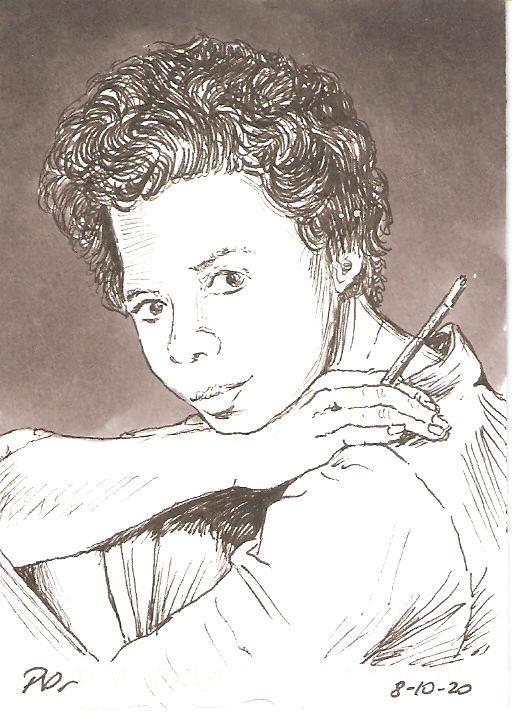
An ongoing illustrative history study
This piece originally posted 9/29/2020
Prelude | 38 | 39 | 40 | 41 | 42 | 43 | 44 | 45 | 46 | Email |
|---|
"I have long since passed that period when I felt personal discomfort at the sight of an ill-dressed or illiterate Negro. Social awareness has taught me where to lay the blame."
Playwright Lorraine Hansberry was born in 1930 to a Chicago family that would already write itself into history --her father, Carl Augustus Hansberry, was himself a successful real estate broker and founded one of the first Negro banks in Chicago. He and Lorraine's mother, Nannie Louise Perry, fought entrenched discrimination when the family had the temerity to try to purchase a home in a white neighborhood. This challenge to neighborhood covenants and its resultant civil rights case went all the way to the Supreme Court (see Hansberry v. Lee, 1950). While the court technically ruled in Hansberry's favor, there remained much contention, and seeds were sown for future storytelling.
The Hansberry family enjoyed a number of connections to prominent Black leaders at the time, including W.E.B. Du Bois (see Lesson #1 in this series) and family friend Paul Robeson (see Lesson #18 in this series), all of which played a role in setting Lorraine on her life's trajectory. It was in Robeson's monthly paper Freedom that Lorraine's writing talents and passions emerged as a powerful anti-segregationist force in their own right. In 1952, Hansberry attended a peace conference in Uruguay, in place of Robeson, who had been denied travel permissions by the U.S. State Department. Naturally this landed her on an FBI watch list as a potentially dangerous "Pan-Africanist."
In 1957 Hansberry drew upon her Chicago upbringing and wrote The Crystal Stair, a play about a struggling Black family in Chicago, which she later retitled A Raisin in the Sun (a line from a Langston Hughes poem, "Harlem: A Dream Deferred"). The play enjoyed a run of 530 performances --the the first play produced on Broadway by an African American woman. A film version starring Sidney Poitier was released in 1961, which received an award at Cannes. There have since been two Emmy-winning television remakes, and two Tony-winning Broadway revivals. The enduring appeal of this play furthered Lorraine's status as a voice for civil rights. Significantly she was present for the May 24, 1963 New York meeting between Attorney General Robert F. Kennedy and James Baldwin (see Lesson #14 in this series).
A phrase coined by Hansberry, "To Be Young, Gifted, and Black," was turned into a song by Nina Simone (see Lesson #11 in this series), and has since become something of a civil rights anthem. Hansberry's phrase was prominently cited by Chadwick Boseman in his acceptance speech at the SAG Awards in January 2019, on behalf of the cast and crew of Marvel's Black Panther.
Next page - Lesson 43: Alvin Ailey